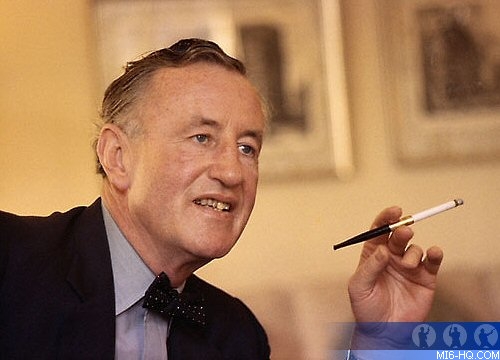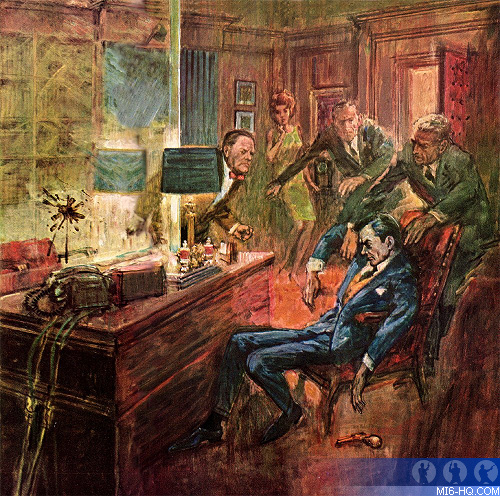 |
| |
MI6 guest writer Neil McNally looks at the influence
of Ian Fleming's later novels in the new film "Skyfall"...
|
|
Fleming and Skyfall
28th November 2012
“My plots are fantastic, while being often based upon
truth. They go wildly beyond the probable but not, I think, beyond
the possible.” - Ian Fleming
With the recent arrival of “Skyfall” on movie screens
the world has been reminded of what makes a great Bond film excel.
The elements that go into it are many and varied; however, by
all accounts the creative team really focused on what has always
kept Bond, Bond: Ian Fleming. Director Sam Mendes recently stated
that while making the movie “Whenever you’re stuck,
go back to Fleming. Capture the essence of Ian Fleming.” “Skyfall” does
just that, not only in tone and character, but by wisely mirroring
plot points and development that have already been on the printed
page for close to fifty years.
The film’s central storyline of the figurative
death and rebirth of 007 can trace its origins to two Fleming
novels 'You
Only Live Twice' and 'The
Man with the Golden Gun'. The former is the conclusion to
what has since been coined “The Blofeld Trilogy,” while
the latter has the distinction of being the final James Bond
novel
that
Fleming wrote in his lifetime.

Above: James Bond creator Ian
Fleming.
|
Both books lend the film some of their most
crucial and poignant scenes'.You Only Live Twice' picks up sometime
after
the tragic events of 'On Her
Majesty’s Secret Service.'
Bond is an emotional wreck after having lost his wife in an assassination
attempt by his long standing enemy Ernst Stavro Blofeld. M,
fearing the worst, gives Bond a final chance with one last mission.
A failed haiku written by Bond later on in the book only serves
to heighten the tension:
You only live twice:
Once when you are born
And once when you look death in the face
By its conclusion, Bond has once and for all
killed Blofeld and regained his sense of self and purpose in
the world. However,
all of this proves to be in vain when he suffers amnesia from
a head injury after blowing up Blofeld’s lair. Aided by
the story’s heroine, Kissy Suzuki, Bond believes himself
to be a fisherman. In this fragile state, his
memories of his past life as a spy are gone, and the world believes
him
to be dead. All he can do is flee to Russia for clues about his
true identity. Back in London, M solemnly pens Bond’s obituary
for “The Times.” It is here that Fleming fleshes
out 007’s life, and for the first time gave readers a glimpse
of his backstory.
To a lesser extent, 'The Man with the Golden
Gun' takes
this journey full circle. 007 mysteriously re-emerges from his
so-called “death”; demanding to speak with M at Secret
Service headquarters. Unfortunately for M, Bond has been brainwashed
during his investigation in Soviet Russia with orders to kill
him with a cyanide pistol. Fortunately, the attempt is unsuccessful
and
Bond is able to regain his sanity and identity through government
reprogramming. But, with his career in question, 007 is at a
crossroads and must prove himself once again to M and the Service.

Above: Illustration from Playboy's
serialization of Ian Fleming's 1965 novel
''The Man
With The Golden Gun'.
|
Whether this introspective view of Bond was due to Fleming’s
own declining health at the time is up for conjecture. Regardless,
his overall themes in 'You Only Live Twice' and 'The
Man with the Golden Gun' of self-doubt and an emotional “rebirth” cast
one half of the large Fleming shadow over “Skyfall.” The
other half being Bond’s personality as a whole within the
film series.
Over the years, times and tastes change, and it
certainly has shifted from one extreme to the other. However,
it never quite aligned perfectly with the novels, and it took
the
Timothy Dalton films to give us a taste of what was to come with
Daniel Craig. In the end, what the audience sees now on screen
is a reflection of the dark, brooding, cold assassin envisioned
in 1953’s 'Casino Royale.' A reflection that,
if you look close enough, resembles Ian Fleming more than Daniel
Craig.
With M’s obituary scene left intact, Bond’s Scottish
heritage, the names of his parents revealed, and most importantly
007’s character arc, Ian Fleming’s work and vision
is alive, well, and thriving in “Skyfall.” The film’s
success at the box office and with critics is not only due to
a skilled group of filmmakers but, to the old adage “Everything
old is new again!” An adage even 007 himself would have
trouble escaping from.
Thanks to Neil McNally.